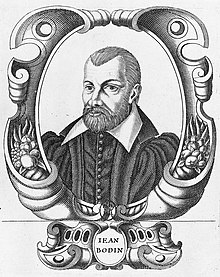Jean Bodin

Jean Bodin, also known in Spanish as Juan Bodin or Juan Bodino (Angers, 1529/1533 - Laon, 1596) was a prominent French intellectual who developed his ideas in the fields of philosophy, law, political science and economics. Along with Cardinal Richelieu and his jurists, he is considered one of the founders of French absolutism.
Through his work he made notable contributions to the Theory of the State. In this regard, one can mention his book The Six Books of the Republic, where he early established the concept of & # 34; sovereignty & # 34; and the foundations that would later inspire Hobbes and Locke; the theoretical bases of absolute monarchy (commanding power, absolute power, indivisible power, perpetual power). Other contributions include oversight of the powers of judges and administration and the establishment of fundamental distinctions between state and government.
Biography
Bodin was born into a family of wealthy artisans, his mother named Catherine Duterte and his father Guillaume Bodin. In his youth he received training in the Carmelite cloisters in Angers. In Paris, he followed courses at the University and at the Collège de France, imbuing himself with medieval scholasticism and Renaissance humanism. Beginning in 1549 he was freed from monastic vows. He studied and taught Roman law at the University of Toulouse during the 1550s.
He returned to Paris in 1561, at a time when the religious wars began. Bodin is no stranger to his time, and having been a Carmelite friar, he was attracted to rabbinic teachings, as well as the reformed current of John Calvin.
In Paris he practiced as a lawyer and as a member of the Paris Parliament (higher court of justice).
From 1566 onwards he began to dedicate himself to the topics that would mark his thinking: the philosophy of history, the philosophy of the State and the Economy.
Did you mean:Asentado en Land, ejerciendo como procurador, murió de peste en 1596.
Thoughts
Bodin's thought is projected in at least two directions:
Political thought
Jean Bodin writes and thinks in the context of the religious wars between Calvinists (Huguenots) and Catholics in France in the 16th century. He affirms that the origin of authority is in the pact that occurs between the various families that make up the elites of a society, who should agree on a person or institution to exercise authority and govern. Therefore, the person who holds authority must have all the power and must be obeyed by everyone.
For Bodin, God is the foundation of human reason and human nature. And then Men agree to seek an authority. For this reason, the State must not be determined by the metropolis and must respect it.
There are various possible forms of government, taking into account where sovereignty is concentrated:
- In democracy the people as a body possess sovereign power.
- In the aristocracy sovereignty is possessed by a lesser part of that body.
- In the monarchy sovereignty is concentrated in a person.
In his book Démonomanie des sorciers, he offered countless ideas on how to torture potential witches and sorcerers, ideas often criticized by his own colleagues in Parliament. By following these methods, he believed, the Inquisition would not judge anyone unfairly.
His first text on monetary theory was a response to Monsieur de Malestroit, who had sought to deny the rise of prices in the long term. In his writing, Bodin maintains that prices rise due to different causes, the main of which is the increase in the existing quantities of gold and silver (noting, in addition, the influence of monopolies and other causes).
Published in 1568, the text had great influence in Europe. For a long time it was considered the first exposition of a quantitative theory of money. But that impression has been questioned after the recent discovery of a previous scientific construction on this matter, prepared by thinkers from the School of Salamanca (specifically, by Martín de Azpilcueta), who had already described the inflationary effects of the massive import of metals.. Some maintain that it is likely that Bodino was familiar with the ideas of that Spanish school (and point out, in particular, that he had coincided with Martín de Azpilcueta at the University of Toulouse).
In The six books of the Republic (in the sixth, in particular), Bodino makes an exposition of mercantilist economic principles, advocating the establishment of limitations on the departure of raw materials and the importation of non-essential manufacturing. However, he defends international trade, maintaining that one's gain does not necessarily mean another's loss.
Works
- Methodus ad facilem historiarum cognitionem (1566).
- Paradoxes de M. de Malestroit touchant le fait des monnaies et l'enrichissement de toutes choses (1568).
- Les six livres de la République (1576).
- Demonomanie des sorciers (1580).
- Iuris universi distributio (1580).
- Le théâtre de la nature universelle (1596), included in the Catholic Church's forbidden book index.
- Colloquium Heptaplomeres de rerum sublimium arcanis abditisor Colloquium of the seven sages on arches concerning the last questions (published until 1858, ed. by L. Noack).
Contenido relacionado
Ephialtes of Athens
Karl Kautsky
Lenin
Polybius
Hal Draper